Kathleen Jones's Blog, page 40
August 4, 2014
Tuesday Poem: 'I sing because I sing', Mahmoud Darwish and Yehuda Amichai
This week I'm posting a powerful poem by one of the great Palestinian poets, the voice of exile, Mahmoud Darwish, and another by one of the greatest Israeli poets, Yehuda Amichai, writing about the loneliness of exile and the need for homeland.
Earth Poem
A dull evening in a run-down village
Eyes half asleep
I recall thirty years
And five wars
I swear the future keeps
My ear of corn
And the singer croons
About a fire and some strangers
And the evening is just another evening
And the singer croons
And they asked him:
Why do you sing?
And he answered:
I sing because I sing . . .
...................
And they searched his chest
But could only find his heart
And they searched his heart
But could only find his people
And they searched his voice
But could only find his grief
And they searched his grief
But could only find his prison
And they searched his prison
But could only see themselves in chains.
© Mahmoud Darwish
Half the People in the World
Half the people in the world love the
other half, half the people hate the
other half . Must I, because of those
and the others, go and wander and
endlessly change, like rain in its cycle,
and sleep among rocks, and be rugged
like the trunks of olive trees, and hear
the moon bark at me and camouflage
my love with worries, and grow like the
timorous grass in between railway
tracks, and live in the ground like a
mole, and be with roots and not with
branches, and not rest my cheek upon
the cheeks of angels, and make love in
the first cave, and marry my wife under
the canopy of beams which support the
earth, and act out my death, always to
the last breath and the last words,
without ever understanding, and put
flagpoles on top of my house and a
shelter at the bottom. And set forth on
the roads made only for returning, and
go through all the terrifying stations -
cat, stick, fire, water, butcher, - between
the kid and the angel of death?
© Yehuda Amichai
 Yehuda Amichai was born in Germany to an Orthodox Jewish family who emigrated to Palestine in 1935. He fought in World War II and began writing poetry in 1946 while stationed with the British Army in Egypt. Amichai later fought in the Israeli War of Independence, the 1956 Sinai War, and then in the Yom Kippur War of 1973. His experiences led to a complete change of heart. He became an advocate of peace and reconciliation in the region, working with Arab writers. One of his poems, "God has pity on kindergarten children", was read at the Nobel Peace Prize presentation in 1994. He died from cancer in 2000.
Yehuda Amichai was born in Germany to an Orthodox Jewish family who emigrated to Palestine in 1935. He fought in World War II and began writing poetry in 1946 while stationed with the British Army in Egypt. Amichai later fought in the Israeli War of Independence, the 1956 Sinai War, and then in the Yom Kippur War of 1973. His experiences led to a complete change of heart. He became an advocate of peace and reconciliation in the region, working with Arab writers. One of his poems, "God has pity on kindergarten children", was read at the Nobel Peace Prize presentation in 1994. He died from cancer in 2000.
 Mahmoud Darwish was born in Palestine in 1941 and is regarded as the Palestinian national poet. In his work, Palestine became a metaphor for the loss of Eden, birth and resurrection, and the anguish of dispossession and exile. One of his last collections was called ‘Unfortunately it was Paradise’. His voice, more than any other, articulates the suffering of the Palestinian people. It was written from personal experience. His family were farmers, but their village near Galilee was invaded by Israeli forces in 1948 and razed to the ground to prevent the inhabitants from returning. Darwish spent some time living in Haifa where he fell in love with a Jewish woman - a relationship that could not be allowed. He left Israel to study in 1970. Darwish spent most of his life in exile, being allowed to return to live in Ramallah in 1995. He was an outspoken critic of the rivalry between Fatah and Hamas, as well as the Israeli state. One of his most famous poems is "A Soldier Dreams of White Lilies", featured in the film
‘Id-the identity of the soul’
. He died from heart failure in 2008.
Mahmoud Darwish was born in Palestine in 1941 and is regarded as the Palestinian national poet. In his work, Palestine became a metaphor for the loss of Eden, birth and resurrection, and the anguish of dispossession and exile. One of his last collections was called ‘Unfortunately it was Paradise’. His voice, more than any other, articulates the suffering of the Palestinian people. It was written from personal experience. His family were farmers, but their village near Galilee was invaded by Israeli forces in 1948 and razed to the ground to prevent the inhabitants from returning. Darwish spent some time living in Haifa where he fell in love with a Jewish woman - a relationship that could not be allowed. He left Israel to study in 1970. Darwish spent most of his life in exile, being allowed to return to live in Ramallah in 1995. He was an outspoken critic of the rivalry between Fatah and Hamas, as well as the Israeli state. One of his most famous poems is "A Soldier Dreams of White Lilies", featured in the film
‘Id-the identity of the soul’
. He died from heart failure in 2008.
If you would like to see what other Tuesday Poets are posting around the world then please hop over to the Tuesday Poem hub and take a look.
Earth Poem
A dull evening in a run-down village
Eyes half asleep
I recall thirty years
And five wars
I swear the future keeps
My ear of corn
And the singer croons
About a fire and some strangers
And the evening is just another evening
And the singer croons
And they asked him:
Why do you sing?
And he answered:
I sing because I sing . . .
...................
And they searched his chest
But could only find his heart
And they searched his heart
But could only find his people
And they searched his voice
But could only find his grief
And they searched his grief
But could only find his prison
And they searched his prison
But could only see themselves in chains.
© Mahmoud Darwish
Half the People in the World
Half the people in the world love the
other half, half the people hate the
other half . Must I, because of those
and the others, go and wander and
endlessly change, like rain in its cycle,
and sleep among rocks, and be rugged
like the trunks of olive trees, and hear
the moon bark at me and camouflage
my love with worries, and grow like the
timorous grass in between railway
tracks, and live in the ground like a
mole, and be with roots and not with
branches, and not rest my cheek upon
the cheeks of angels, and make love in
the first cave, and marry my wife under
the canopy of beams which support the
earth, and act out my death, always to
the last breath and the last words,
without ever understanding, and put
flagpoles on top of my house and a
shelter at the bottom. And set forth on
the roads made only for returning, and
go through all the terrifying stations -
cat, stick, fire, water, butcher, - between
the kid and the angel of death?
© Yehuda Amichai
 Yehuda Amichai was born in Germany to an Orthodox Jewish family who emigrated to Palestine in 1935. He fought in World War II and began writing poetry in 1946 while stationed with the British Army in Egypt. Amichai later fought in the Israeli War of Independence, the 1956 Sinai War, and then in the Yom Kippur War of 1973. His experiences led to a complete change of heart. He became an advocate of peace and reconciliation in the region, working with Arab writers. One of his poems, "God has pity on kindergarten children", was read at the Nobel Peace Prize presentation in 1994. He died from cancer in 2000.
Yehuda Amichai was born in Germany to an Orthodox Jewish family who emigrated to Palestine in 1935. He fought in World War II and began writing poetry in 1946 while stationed with the British Army in Egypt. Amichai later fought in the Israeli War of Independence, the 1956 Sinai War, and then in the Yom Kippur War of 1973. His experiences led to a complete change of heart. He became an advocate of peace and reconciliation in the region, working with Arab writers. One of his poems, "God has pity on kindergarten children", was read at the Nobel Peace Prize presentation in 1994. He died from cancer in 2000. Mahmoud Darwish was born in Palestine in 1941 and is regarded as the Palestinian national poet. In his work, Palestine became a metaphor for the loss of Eden, birth and resurrection, and the anguish of dispossession and exile. One of his last collections was called ‘Unfortunately it was Paradise’. His voice, more than any other, articulates the suffering of the Palestinian people. It was written from personal experience. His family were farmers, but their village near Galilee was invaded by Israeli forces in 1948 and razed to the ground to prevent the inhabitants from returning. Darwish spent some time living in Haifa where he fell in love with a Jewish woman - a relationship that could not be allowed. He left Israel to study in 1970. Darwish spent most of his life in exile, being allowed to return to live in Ramallah in 1995. He was an outspoken critic of the rivalry between Fatah and Hamas, as well as the Israeli state. One of his most famous poems is "A Soldier Dreams of White Lilies", featured in the film
‘Id-the identity of the soul’
. He died from heart failure in 2008.
Mahmoud Darwish was born in Palestine in 1941 and is regarded as the Palestinian national poet. In his work, Palestine became a metaphor for the loss of Eden, birth and resurrection, and the anguish of dispossession and exile. One of his last collections was called ‘Unfortunately it was Paradise’. His voice, more than any other, articulates the suffering of the Palestinian people. It was written from personal experience. His family were farmers, but their village near Galilee was invaded by Israeli forces in 1948 and razed to the ground to prevent the inhabitants from returning. Darwish spent some time living in Haifa where he fell in love with a Jewish woman - a relationship that could not be allowed. He left Israel to study in 1970. Darwish spent most of his life in exile, being allowed to return to live in Ramallah in 1995. He was an outspoken critic of the rivalry between Fatah and Hamas, as well as the Israeli state. One of his most famous poems is "A Soldier Dreams of White Lilies", featured in the film
‘Id-the identity of the soul’
. He died from heart failure in 2008.If you would like to see what other Tuesday Poets are posting around the world then please hop over to the Tuesday Poem hub and take a look.
Published on August 04, 2014 11:57
July 29, 2014
Tuesday Poem: Union Local '64 by Tim Bowling
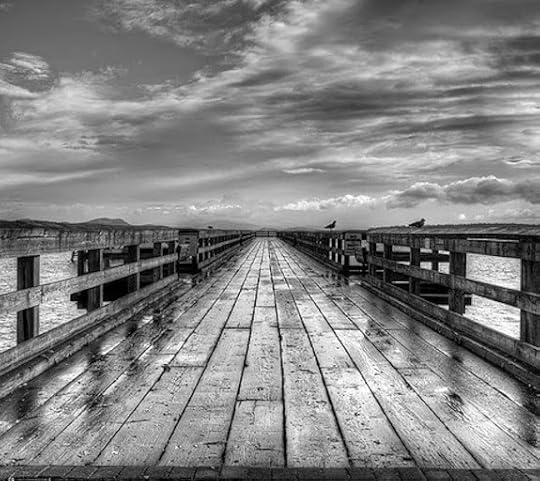
UNION LOCAL 64
Last night I caught the boy I'd been
in fishnet and gutted him
on the government wharf
by the light of an oil lamp
hung from my dead father's hand.
Above the dyke, over the road,
the town was just the same:
weeping willows, widows,
whale-stains on the cheesecloth walls
of the first houses
and an overwhelming sense
of a last breath being taken.
The worst of it was
the ordinary blood
on the ordinary wood
and my father saying
as he gazed out to sea
"It's no good.
The companies won't pay.
They didn't pay for mine
and they won't pay for yours."
I watched him through my mother's eyes
as he sighed and bent
to the stiffened body of our time
together not worth one red cent
to anyone and picked it up
and took his life and mine away again.
From Circa Nineteen Hundred and Grief (Gaspereau, 2014) by Tim Bowling
(Photo by Barry Pettinger)
Cross-blogged from Véhicule Press
"Tim Bowling has published numerous poetry collections, including Low Water Slack; Dying Scarlet (winner of the 1998 Stephan G. Stephansson Award for poetry);Darkness and Silence (winner of the Canadian Authors Association Award for Poetry); The Witness Ghost; andThe Memory Orchard (both nominated for the Governor General's Literary Award). He is also the author of three novels, Downriver Drift (Harbour), The Paperboy's Winter(Penguin) and The Bone Sharps (Gaspereau Press). His first book of non-fiction, The Lost Coast: Salmon, Memory and the Death of Wild Culture (Nightwood Editions), was shortlisted for three literary awards: The Writers' Trust Nereus Non-Fiction Award, the BC Book Prizes' Roderick Haig-Brown Regional Prize and the Alberta Literary Awards' Wilfred Eggleston Award for Non-Fiction. The Lost Coastwas also chosen as a 2008 Kiriyama Prize "Notable Book." Bowling is the recipient of the Petra Kenney International Poetry Prize, the National Poetry Award and the Orillia International Poetry Prize. Bowling was the recipient of a Guggenheim Fellowship in 2008. A native of the West Coast, he now lives in Edmonton Alberta. His latest collections of poetry are Tenderman (Nightwood), and Circa Nineteen Hundred and Grief."
Published on July 29, 2014 04:49
July 28, 2014
Know your rights - with Ryanair customer service
This morning it was breakfast on the terrace with apricots and peaches in hazy sunshine with the Mediterranean somewhere in the distance. But it almost didn't happen due to huge thunderstorms that deluged the area around Pisa, closing the airport for hours. The Ryanair plane I was due to fly on was still stuck on the ground at Pisa at the time it was due to take off from UK. 7 hours in Liverpool airport is no joke!! There was very little information on the ground - a lot of rumours, but I found their customer service impeccable. Ryanair get a lot of knocks, but I'm a frequent flyer (sometimes 2 or 3 times a month) and have been for years and this is the first time I've encountered real problems. They may not be lovable, but they are certainly efficient - I can usually rely on them to be on time.
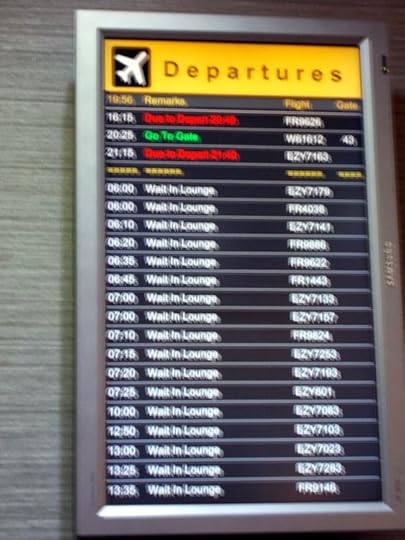
I'm registered with Ryanair, which makes it easier to book since they have all my details already, and was pleasantly surprised that I got regular text messages updating me on the progress of the flight which were far more accurate than the departure board. I was even able to tell fellow sufferers what time the flight had left Pisa! After a 2 hour delay, they began giving out vouchers for food and drink at the Ryanair gates, which you could get by showing your boarding pass. At 6.30pm I was sent an email telling me the estimated time of the flight departure and telling me that I could cancel and get my money back immediately if I wished, or that I could transfer free of charge to any other Ryanair flight that had seats. In the end I waited, arriving in Pisa in the middle of the night, facing a long taxi ride home (which I can claim on my travel insurance). I'm copying the info at the bottom of this post, just in case anyone wants to be sure of their rights in a similar situation.
I got back to the house in torrential rain to find branches off trees, water everywhere, no electricity and a stinking fridge full of mouldy food - apparently a storm earlier in the week had kicked out the power. Not the kind of homecoming I'd planned, but all is back to normal this morning. And I have no complaints about Ryanair's customer service - they've obviously been listening to critics. It must have been a nightmare for them, because 12.30am Sunday morning they had a plane and crew in Pisa that were supposed to be in Malta and lots of other planes around Europe all in the wrong places, not to mention a lot of disgruntled passengers! Spare a thought for the operations manager.
Now, I'm off to enjoy the sun before the next storm due to arrive early tomorrow......
Dear Customer
Ryanair sincerely apologises for the delay to your flight the FR9626, from Liverpool to Pisa on the 26-07-2014.
Please see below the 2 options available to you:
1. Transfer from the delayed flight to another Ryanair flight - Free of Charge
When a flight is delayed more than 2 hours after its scheduled time of departure, you can (if you wish) transfer from the delayed flight free of charge (subject to seat availability) to an alternative Ryanair flight to/from different departure or destination airports or via another airport served by Ryanair, please contact Reservations (subject to opening hours) or go to the airport ticket desk/handling agent desk.
If you transfer to a new Ryanair flight on the same or following day and cannot re-print your boarding pass it will be re-issued free of charge at the airport ticket desk.
2. Apply for a refund if you choose not to travel
If due to the flight delay you wish to cancel your reservation and claim a full refund of your unused flight(s) please go to the ticket desk in the airport or contact our Reservations Department (subject to opening hours). Refunds will be
processed in 7 working days back to the form of payment used to pay for the original booking
FREE PHONE CREDIT
Click here www.callcardpins.com
[image error] to view the access number from your country then dial that number and enter the following unique 10 digit pin 5964363761 to receive your free phone credit valid for 24 hours from the time of issue.
Click on the following link for information on Passenger Rights under EU Regulation - EU261/2004 – 14.2 NOTICE
We again sincerely apologise for the inconvenience caused by this flight delay.
Yours sincerely
Ryanair Customer Services

I'm registered with Ryanair, which makes it easier to book since they have all my details already, and was pleasantly surprised that I got regular text messages updating me on the progress of the flight which were far more accurate than the departure board. I was even able to tell fellow sufferers what time the flight had left Pisa! After a 2 hour delay, they began giving out vouchers for food and drink at the Ryanair gates, which you could get by showing your boarding pass. At 6.30pm I was sent an email telling me the estimated time of the flight departure and telling me that I could cancel and get my money back immediately if I wished, or that I could transfer free of charge to any other Ryanair flight that had seats. In the end I waited, arriving in Pisa in the middle of the night, facing a long taxi ride home (which I can claim on my travel insurance). I'm copying the info at the bottom of this post, just in case anyone wants to be sure of their rights in a similar situation.
I got back to the house in torrential rain to find branches off trees, water everywhere, no electricity and a stinking fridge full of mouldy food - apparently a storm earlier in the week had kicked out the power. Not the kind of homecoming I'd planned, but all is back to normal this morning. And I have no complaints about Ryanair's customer service - they've obviously been listening to critics. It must have been a nightmare for them, because 12.30am Sunday morning they had a plane and crew in Pisa that were supposed to be in Malta and lots of other planes around Europe all in the wrong places, not to mention a lot of disgruntled passengers! Spare a thought for the operations manager.
Now, I'm off to enjoy the sun before the next storm due to arrive early tomorrow......
Dear Customer
Ryanair sincerely apologises for the delay to your flight the FR9626, from Liverpool to Pisa on the 26-07-2014.
Please see below the 2 options available to you:
1. Transfer from the delayed flight to another Ryanair flight - Free of Charge
When a flight is delayed more than 2 hours after its scheduled time of departure, you can (if you wish) transfer from the delayed flight free of charge (subject to seat availability) to an alternative Ryanair flight to/from different departure or destination airports or via another airport served by Ryanair, please contact Reservations (subject to opening hours) or go to the airport ticket desk/handling agent desk.
If you transfer to a new Ryanair flight on the same or following day and cannot re-print your boarding pass it will be re-issued free of charge at the airport ticket desk.
2. Apply for a refund if you choose not to travel
If due to the flight delay you wish to cancel your reservation and claim a full refund of your unused flight(s) please go to the ticket desk in the airport or contact our Reservations Department (subject to opening hours). Refunds will be
processed in 7 working days back to the form of payment used to pay for the original booking
FREE PHONE CREDIT
Click here www.callcardpins.com
[image error] to view the access number from your country then dial that number and enter the following unique 10 digit pin 5964363761 to receive your free phone credit valid for 24 hours from the time of issue.
Click on the following link for information on Passenger Rights under EU Regulation - EU261/2004 – 14.2 NOTICE
We again sincerely apologise for the inconvenience caused by this flight delay.
Yours sincerely
Ryanair Customer Services
Published on July 28, 2014 04:23
July 23, 2014
The Music of Exile
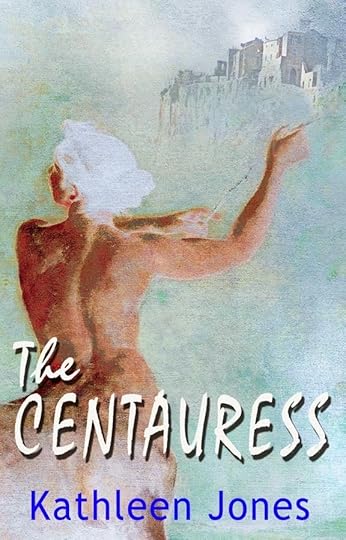 Today, Roz Morris is featuring the music that helped to create
The Centauress
on her website
at The Undercover Soundtrack.
Most of the characters in
The Centauress
are expatriates or exiles living in a Europe scarred by decades of division and war and ethnic hatred. The novel is set in Istria which was part of Italy before 1945, then became part of Yugoslavia and is now in Croatia. The novel's narrator, Alex Forbes, has lost her husband and child in a terrorist attack and is struggling to find a reason to carry on living. She goes to Istria to research the biography of a controversial artist, Zenobia de Braganza, born 'between genders' at a time when such things were poorly understood. Zenobia has lived her life in a kind of exile, neither male nor female, neither Italian nor Croatian. In trying to understand Zenobia's life, Alex begins to come to terms with her own loss and is able to accept love in a new relationship.
Today, Roz Morris is featuring the music that helped to create
The Centauress
on her website
at The Undercover Soundtrack.
Most of the characters in
The Centauress
are expatriates or exiles living in a Europe scarred by decades of division and war and ethnic hatred. The novel is set in Istria which was part of Italy before 1945, then became part of Yugoslavia and is now in Croatia. The novel's narrator, Alex Forbes, has lost her husband and child in a terrorist attack and is struggling to find a reason to carry on living. She goes to Istria to research the biography of a controversial artist, Zenobia de Braganza, born 'between genders' at a time when such things were poorly understood. Zenobia has lived her life in a kind of exile, neither male nor female, neither Italian nor Croatian. In trying to understand Zenobia's life, Alex begins to come to terms with her own loss and is able to accept love in a new relationship.When I wrote the Undercover Soundtrack blog for Roz, several weeks ago, Flight MH17 had not been shot down and Israel had not begun its offensive against Palestine, but by a tragic coincidence what was written echoes what is happening in the real world now. Although the characters in the novel have had their lives torn apart by terrorism and ethnic conflict, The Centauress is an optimistic book where everything is possible if we care enough. One of the tracks I featured is an example of that optimism.
I listened to music from the exiled Palestinian diaspora as part of the creation of the novel and I've included a track sung by Reem Khalani, backed by Israeli musician Gilad Atzmon whose band 'Orient House' includes both Israeli and Palestinian musicians. Gilad unequivocally opposes his country's policies towards Palestine. Reem Khalani sings the powerful and moving lament 'Dal' ouna - On the Return' - something most Palestinian exiles would like to do. I'm putting a link to it below as a tribute. Events on the television news are so terrible I can't watch any more, particularly with the knowledge that the British were instrumental in the dispossession of the Palestinian people after the second world war. Ludo, in the nove l, complains that the Superpowers divided Europe 'like slicing a cake' - and he's right.
If you'd like to know more about the European folk music I used for The Centauress, please click here for The Undercover Soundtrack. There's also the chance to win 3 free copies of the novel.
Published on July 23, 2014 05:31
July 21, 2014
Tuesday Poem: Storm on Facebook
Storm on Facebook
I don’t know how to ‘Heart’ this big wind
bullying my doors and windows with strange suggestions
I can’t even ‘Like’
or ‘Share’ the feeling that knots my stomach
leaving my mouth dry.
If I don’t go out, it will threaten to come in
so I cower under the quilt
putting up pictures of cute dogs
and kittens in boxes.
But the wind comes guttering
beneath the tiles of the roof
pushing the wall back with a sudden gust
going Viral.
© Kathleen Jones 2014
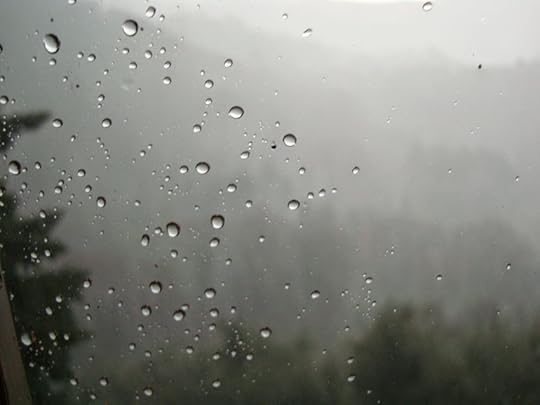 'Nubifragio' - CloudburstWritten under a quilt at Peralta, sharing a bed with Ellie, Vaniglia, Pino and Bisco (1 dog and 3 cats) during a once in a hundred year event that chucked down 300mm rain, felled trees and washed the road away, leaving the hamlet isolated for 6 months. We didn't have any electricity, so the pictures went up on Facebook afterwards!
'Nubifragio' - CloudburstWritten under a quilt at Peralta, sharing a bed with Ellie, Vaniglia, Pino and Bisco (1 dog and 3 cats) during a once in a hundred year event that chucked down 300mm rain, felled trees and washed the road away, leaving the hamlet isolated for 6 months. We didn't have any electricity, so the pictures went up on Facebook afterwards!
 The morning after
The morning after
 A terrified Ellie
A terrified Ellie
 Vaniglia unmoved!
Vaniglia unmoved!
I don’t know how to ‘Heart’ this big wind
bullying my doors and windows with strange suggestions
I can’t even ‘Like’
or ‘Share’ the feeling that knots my stomach
leaving my mouth dry.
If I don’t go out, it will threaten to come in
so I cower under the quilt
putting up pictures of cute dogs
and kittens in boxes.
But the wind comes guttering
beneath the tiles of the roof
pushing the wall back with a sudden gust
going Viral.
© Kathleen Jones 2014
 'Nubifragio' - CloudburstWritten under a quilt at Peralta, sharing a bed with Ellie, Vaniglia, Pino and Bisco (1 dog and 3 cats) during a once in a hundred year event that chucked down 300mm rain, felled trees and washed the road away, leaving the hamlet isolated for 6 months. We didn't have any electricity, so the pictures went up on Facebook afterwards!
'Nubifragio' - CloudburstWritten under a quilt at Peralta, sharing a bed with Ellie, Vaniglia, Pino and Bisco (1 dog and 3 cats) during a once in a hundred year event that chucked down 300mm rain, felled trees and washed the road away, leaving the hamlet isolated for 6 months. We didn't have any electricity, so the pictures went up on Facebook afterwards!  The morning after
The morning after A terrified Ellie
A terrified Ellie Vaniglia unmoved!
Vaniglia unmoved!
Published on July 21, 2014 15:30
July 19, 2014
The tragic feminisation of Baby M
In my new novel,
The Centauress,
I deal with the dilemmas faced by the 1 in 2000 children born every year with indeterminate gender - 'intersex'. The policy recently has been to intervene surgically - creating either a boy or a girl (usually the latter) where there is confusion.
A new article in The Atlantic,
just out today, reveals the dangers of this procedure - focusing on the tragic case of baby M who was ''feminised' while in foster care, but later became quite definitely a boy. Unfortunately his (albeit imperfect) genitalia had been removed.
In my novel, the intersex consultant, Dr Song Li, is more enlightened and recommends waiting until the child's gender becomes clear. It is possible to live as a 'third sex', though there are issues for children such as bullying at school and the problem of relationships.
The article in The Atlantic asks 'Should we fix intersex children?' and sets out the problems posed for the medical profession as well as the social issues faced by the children and their parents.
"When Mark and Pam Crawford took their family to Great Wolf Lodge, a water adventure park, for a week’s vacation, their seven-year-old made a request.
“Since we don’t know anybody,” S asked her parents, “can I be a boy?”
The Crawfords, who adopted S at the age of two, had seen signs for years that she did not think of herself as female.
S didn’t want braided hair; S wanted a haircut “like dad’s.” At Halloween, S wanted to be a superhero, but not Wonder Woman. S wanted to use the men’s bathroom and liked to be referred to as a boy. S already tended to be perceived as a boy by strangers, after requesting a buzz cut about a month before the family’s vacation.
The Department of Social Services had told the Crawfords their child was born with an intersex condition, meaning the baby’s gender was unclear. S's genitals had been surgically reconstructed to look more female.
So at Great Wolf Lodge, S’s parents thought, “Okay.” Maybe, the resort, where no one knew S, would be a safe place to try out being a boy. . .
Read More ......
 The Centauress is available from Amazon Europe -
The Centauress is available from Amazon Europe -
And from Amazon USA -
In my novel, the intersex consultant, Dr Song Li, is more enlightened and recommends waiting until the child's gender becomes clear. It is possible to live as a 'third sex', though there are issues for children such as bullying at school and the problem of relationships.
The article in The Atlantic asks 'Should we fix intersex children?' and sets out the problems posed for the medical profession as well as the social issues faced by the children and their parents.
"When Mark and Pam Crawford took their family to Great Wolf Lodge, a water adventure park, for a week’s vacation, their seven-year-old made a request.
“Since we don’t know anybody,” S asked her parents, “can I be a boy?”
The Crawfords, who adopted S at the age of two, had seen signs for years that she did not think of herself as female.
S didn’t want braided hair; S wanted a haircut “like dad’s.” At Halloween, S wanted to be a superhero, but not Wonder Woman. S wanted to use the men’s bathroom and liked to be referred to as a boy. S already tended to be perceived as a boy by strangers, after requesting a buzz cut about a month before the family’s vacation.
The Department of Social Services had told the Crawfords their child was born with an intersex condition, meaning the baby’s gender was unclear. S's genitals had been surgically reconstructed to look more female.
So at Great Wolf Lodge, S’s parents thought, “Okay.” Maybe, the resort, where no one knew S, would be a safe place to try out being a boy. . .
Read More ......
 The Centauress is available from Amazon Europe -
The Centauress is available from Amazon Europe -
And from Amazon USA -
Published on July 19, 2014 22:20
July 16, 2014
Win a Kindle Fire with The Centauress!

This week I'm taking part in a give-away for The Centauress - click through to the Kindle Book Review if you'd like the chance to win a Kindle Fire completely free!!! I love my Kindle Fire and would never be without it. This is an unbelievable offer.
Check out The Centauress on the Kindle Book Review.
 "Bereaved biographer Alex Forbes goes to war-ravaged Croatia to research the life of celebrity artist Zenobia de Braganza and finds herself at the centre of a family conflict over a disputed inheritance. At the Kaštela Visoko Alex uncovers a mutilated photograph, stolen letters and a story of indeterminate gender, passion and betrayal. But can she believe what she is being told? In order to discover the truth about Zenobia, Alex travels to Istria, Venice, New York and London and, in working through the narrative of Zenobia’s life, Alex begins to make sense of her own and finds joy and love in a new relationship."
"Bereaved biographer Alex Forbes goes to war-ravaged Croatia to research the life of celebrity artist Zenobia de Braganza and finds herself at the centre of a family conflict over a disputed inheritance. At the Kaštela Visoko Alex uncovers a mutilated photograph, stolen letters and a story of indeterminate gender, passion and betrayal. But can she believe what she is being told? In order to discover the truth about Zenobia, Alex travels to Istria, Venice, New York and London and, in working through the narrative of Zenobia’s life, Alex begins to make sense of her own and finds joy and love in a new relationship."
Published on July 16, 2014 05:35
July 14, 2014
Tuesday Poem: Another Exile Paints a Spring Portrait of Katherine Mansfield by Riemke Ensing
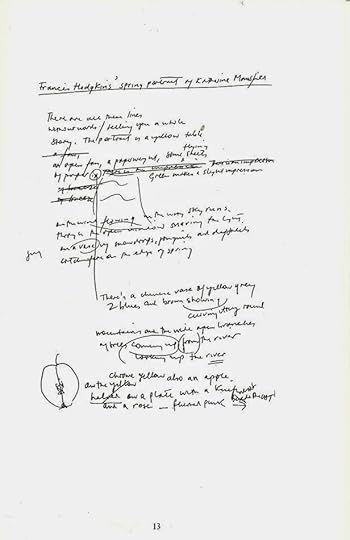
Today I'm the editor of the Tuesday Poem Blog and I'm featuring a poem from 'The K.M. File and Other Poems with Katherine Mansfield' by New Zealand poet Riemke Ensing, so why not hop over to the Tuesday Poem site and take a look?
'There are all these lines
without words telling you a whole
story. The portrait is a yellow table . . . '
Click here to read the poem
Published on July 14, 2014 15:30
Singing a song of angry men for Bastille Day
It's Bastille Day and I thought it would be appropriate to post a song from Les Miserables - one of the most moving musical theatre productions I've ever seen. 'Do you hear the people sing - singing the song of angry men' seems also very appropriate for the times we're living in now. Here it is sung in 17 languages by an international cast.
As a child of the 60s who believed that we could change the world and make it a better place for people (and animals) to live in, I am now a disillusioned and bewildered adult wondering where it all went wrong. This particular song from Les Mis expresses it all - here sung by Ruthie Henshall. 'I had a dream my life would be, so different from the life that I am living'
As a child of the 60s who believed that we could change the world and make it a better place for people (and animals) to live in, I am now a disillusioned and bewildered adult wondering where it all went wrong. This particular song from Les Mis expresses it all - here sung by Ruthie Henshall. 'I had a dream my life would be, so different from the life that I am living'
Published on July 14, 2014 03:01
July 10, 2014
Following the River - the Poetry Path
Today I walked upstream where the River Eden falls through a series of dramatic limestone 'kettles' and gorges and where the river coincides with an abandoned railway.
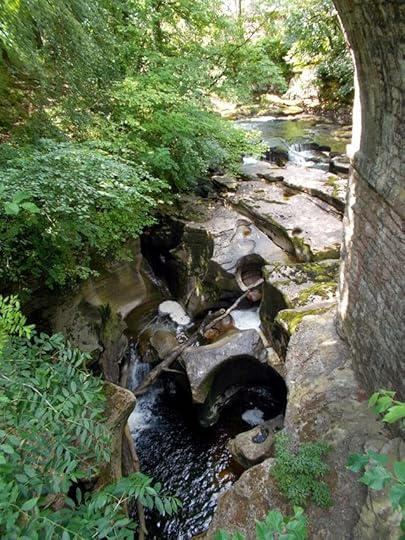 This is the top of the fall
This is the top of the fall
This is Stenkrith, at the entrance to Ravenstonedale, on the edge of the Pennines. What looks like a twig in the photo above, is actually the trunk of a tree washed down by floods. It's impossible to get any sense of scale with a camera, where the river drops from a high sill of rock (high as a multi-storey building), boiling over and under the stone, creating circular holes, deep pools and a dramatic gorge.
 And this is at the bottom
And this is at the bottom
The sound it makes, even on a day when the water level is low, is like being on the edge of a thunderstorm, and the rock shakes with the percussion.

Today, reflected light from the water surface was creating holograms on the walls of the gorge.
The Stainmore Railway, from Kirkby Stephen to Barnard Castle, once ran on the edge of the gorge with fabulous views of the river and the Pennines. it was the second highest line in England, going up to 1370 feet above sea level. Like many small lines, it was axed by Dr Beeching, leaving the small communities here completely isolated. It opened in 1861 and closed in 1961.

Now, only walkers and cyclists use it. To celebrate its opening as a footpath, the poet Meg Peacocke was commissioned to write a series of short poems that were to be carved into stone along the river pathway. The calligrapher who carved them, used special fonts which are now - after years of weathering - very hard to read.

This is one of my favourites -
'Silage tractor incises the first
Green furrow - skillful geometrician
the driver judges an arc of weather'
There are still relics of the railway. This is a platelayers' hut. Does anyone nowadays know what a platelayer did?

And then there's the impressive Podgill Viaduct - 30 arches, more than 84 feet high - a feat of engineering designed by Cumbrian engineer Thomas Bouch who later designed the ill-fated Tay Bridge which collapsed in 1879 with considerable loss of life.
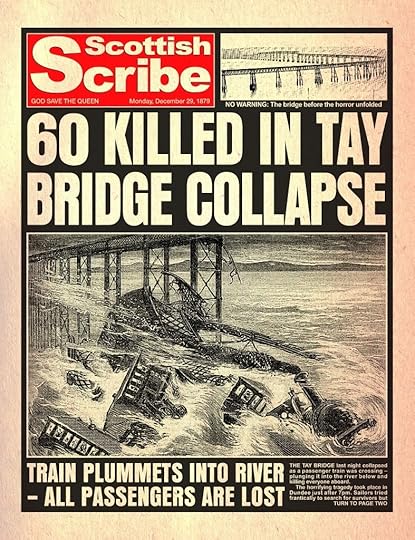
Bouch died later that year, aged 58, a devastated man. Fortunately Podgill is still standing.

Today was what in Cumbria we call a 'borrowed' day - because we know we're going to have to give it back! Such weather as this is something precious - tomorrow it will probably be raining. It isn't called The Lake District for nothing!
 This is the top of the fall
This is the top of the fallThis is Stenkrith, at the entrance to Ravenstonedale, on the edge of the Pennines. What looks like a twig in the photo above, is actually the trunk of a tree washed down by floods. It's impossible to get any sense of scale with a camera, where the river drops from a high sill of rock (high as a multi-storey building), boiling over and under the stone, creating circular holes, deep pools and a dramatic gorge.
 And this is at the bottom
And this is at the bottomThe sound it makes, even on a day when the water level is low, is like being on the edge of a thunderstorm, and the rock shakes with the percussion.

Today, reflected light from the water surface was creating holograms on the walls of the gorge.
The Stainmore Railway, from Kirkby Stephen to Barnard Castle, once ran on the edge of the gorge with fabulous views of the river and the Pennines. it was the second highest line in England, going up to 1370 feet above sea level. Like many small lines, it was axed by Dr Beeching, leaving the small communities here completely isolated. It opened in 1861 and closed in 1961.

Now, only walkers and cyclists use it. To celebrate its opening as a footpath, the poet Meg Peacocke was commissioned to write a series of short poems that were to be carved into stone along the river pathway. The calligrapher who carved them, used special fonts which are now - after years of weathering - very hard to read.

This is one of my favourites -
'Silage tractor incises the first
Green furrow - skillful geometrician
the driver judges an arc of weather'
There are still relics of the railway. This is a platelayers' hut. Does anyone nowadays know what a platelayer did?

And then there's the impressive Podgill Viaduct - 30 arches, more than 84 feet high - a feat of engineering designed by Cumbrian engineer Thomas Bouch who later designed the ill-fated Tay Bridge which collapsed in 1879 with considerable loss of life.

Bouch died later that year, aged 58, a devastated man. Fortunately Podgill is still standing.

Today was what in Cumbria we call a 'borrowed' day - because we know we're going to have to give it back! Such weather as this is something precious - tomorrow it will probably be raining. It isn't called The Lake District for nothing!
Published on July 10, 2014 15:25



